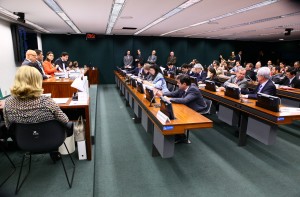Parliamentary Cyber Crimes Inquiry Commission approves final report

Text includes bill that allows judges to block websites and apps dedicated to crimes
The Parliamentary Commission of Inquiry (CPI) on Cyber Crimes approved on Wednesday (4), with 17 votes in favor and six against, the final report of Deputy Espiridião Amin (PP-SC). PT, PCdoB, PTB and Rede recommended the rejection of the text.
CPI maintained in the final report the bill that allows judges to determine the blocking of sites and applications dedicated to the practice of crimes, which had been causing controversy in the commission. The CPI rejected - by 13 votes against 9 - PCdoB's prominence to withdraw the draft report.
Under the bill suggested by deputy rapporteur Rafael Motta (PSB-RN), judges will be able to determine the blocking of access to websites and applications hosted outside the country or that have no representation in Brazil and that are primarily dedicated to the practice of punishable crimes with a minimum sentence of two years in prison, with the exception of crimes against honor.
In this list of crimes that may give rise to the blockade, include, for example, copyright crimes, a practice also known as “piracy” - one of the points that provoked divergences.
Exclusion of messaging services
At the suggestion of deputy Sandro Alex (PSD-PR), one of the CPI's sub-rapporteurs, the final text of the project makes it clear that instant messaging applications, such as WhatsApp, cannot be blocked.
"If our text were in effect, the judge who blocked WhatsApp would be banned from taking the application down," said rapporteur Esperidião Amin. He noted that the court decision that blocked the application earlier this week was taken based on the Marco Civil da Internet (Law 12.965 / 14)
Amin also stressed that the bill that allows the blocking of applications will still have to be processed in the Chamber, as well as the other five projects contained in the report. The six proposals will be processed as projects by the CPI, on a priority basis.
Ineffective measure
One of the deputies opposed to the proposal, Alessandro Molon (Rede-RJ), who was Marco Civil's rapporteur in the Chamber, considers the blocking of sites and applications an ineffective measure to combat cyber crimes. According to him, illegal websites quickly change addresses.
For Molon, it is necessary to investigate who is putting illegal content on the internet and to arrest these people, because "criminals do not stop committing crimes because an address is blocked". Also according to the deputy, the judge who determined the blockade of WhatsApp misread the Marco Civil.
Content withdrawal
The CPI also maintained in the final report another controversial point in the text: the bill that provides that internet service providers remove from the network, without the need for a new judicial decision, content equal to others that have already had the withdrawal determined by the courts.
According to the text, a notification from the interested party will be enough for the content to be removed. The commission rejected highlights from the PT and other parties to suppress this proposal from the final report.
Content censorship
Alessandro Molon was one of those who defended the need for a court order to remove identical contents. For him, only the judge can guarantee that the content is the same as others whose removal has already been determined by the courts. The deputy believes that there is a risk that content that is in fact not identical will be censored.
Representative Daniel Coelho (PSDB-PE), one of the CPI's sub-rapporteurs, rejected the idea that a measure could lead to content censorship. The objective of the project, according to Coelho, is to prevent the victim from having to go to court several times to remove content considered illegal that was shared.
For the congressman, who is against the project "is defending the commercial interest of those who manage the network, who do not want any responsibility or cost".
Computer Invasion
The CPI report also includes a project that expands the crime of computer device invasion (computer or cell phone), already provided for in the Penal Code (Decree-Law 2.848/40).
Under the project, the invasion of any computerized system, with or without personal advantage, will become a crime. Currently, the Penal Code considers it a crime to invade a computer device only if the objective of obtaining, tampering with or destroying data or information without authorization from the device owner is proven.
For deputy Leo de Brito (PT-AC), the project penalizes so-called “good hackers”, who invade systems to test their vulnerability. The PT bench showed a suppressive highlight for this proposal, but the highlight was rejected.
The highlight was approved by deputy Nelson Marchezan Junior (PSDB-RS), who expanded the scope of the crime initially foreseen in the report. He called for the deletion of the part of the project that made it clear that the invasion would be considered a crime only if there was "exposure of computerized data to the risk of disclosure or misuse". For him, any invasion has to be criminalized. "Hacker of good is authorized," he said.
Other proposals
Chaired by Congresswoman Mariana Carvalho (PSDB-RO), the Cyber Crime Crimes CPI functioned for nine months, held more than 50 public hearings, listening to about 140 deponents.
The commission's final report also foresees two Proposals for Financial Inspection and Control so that the With the assistance of the Federal Audit Court, the Chamber inspects the National Telecommunications Agency (Anatel), and recommends the consideration of several proposals that are already underway at the Casa.
A CPI also makes referrals to other government agencies to combat this type of crime and calls for an investigation by Facebook, Twitter and Yahoo for alleged crimes against the tax order.
Edition - Newton Araújo



